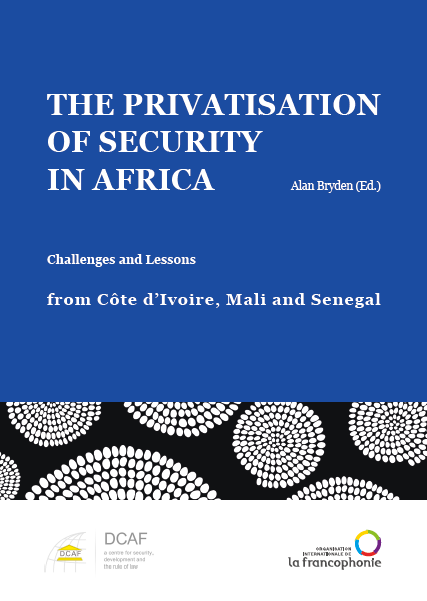Réglementation et Surveillance
Un référentiel d’informations aux niveaux national, régional et international
Sénégal
Le Sénégal a entamé une réforme du secteur de la sécurité privée. À cet effet, le ministère de l'Intérieur a créé en 2018 un comité technique comprenant notamment SYCOFAS, membre de l'Observatoire. Ce comité technique prépare actuellement une nouvelle loi sur la réglementation du secteur de la sécurité privée.
Loi principal régissant la sécurité privée : DECRET N ° 2003-447 DU 18 JUIN 2003
Key Information |
|
Senegal is not a participant to the Montreux Document. |
|
Sector Size (2010)[i]
|
Can PSC personnel carry firearms?
|
International Code of Conduct Association (ICoCA)
|
Voluntary Principles on Security and Human Rights
|
Summary
Senegal is a relatively stable country compared with many others in the West African sub-region. However, since 1982, there has been a separatist insurgency in Casamance in southern Senegal, and the eastern part of the country and Malian border are struggling to recover from conflict. The Senegalese State, despite having consolidated its position as a democratic model for the region, has seen its political and institutional situation deteriorate in recent years. The security sector has become segmented, and private security companies have an important role in strengthening the police.[ii]
The expansion of the private security sector can be partially explained by the state security institutions’ lack of human and material resources and their inability to address the resurgence of urban crime and juvenile delinquency. The constant growth of the private security sector also offers many job opportunities, especially for young people, and provides an alternative to the unemployment that is endemic in the country.
The majority of services offered by Senegalese PSCs originally consisted of security services protecting homes and private institutions. Supply and demand for private security services has evolved, and now also includes personal protection of public figures, cash-in-transit, and electronic security services.
Legal Framework
In 1978, the Senegalese government passed Law No. 78-40, prohibiting private policing and requiring any company offering services including surveillance, guarding, and convoy services for private property to seek authorisation. This law placed PSCs under the collective labour agreement for the business sector and made no account for the special nature of their activities. In 2003, the law was supplemented by Decree No. 2003-447 laying down the conditions for surveillance, guarding, and convoy services for private property.
- Law No. 78-40 (French)
- Decree No. 2003-447 (French)
Challenges
Many challenges regarding the operation of PSCs in Senegal exist. Three of the most important are listed below:
Legal Framework
With a transformation of the security landscape due to the development of new types of threats, it is clear that Senegalese national legislation concerning PSCs is insufficient. The 1978 law and 2003 decree do not take into account the new needs caused by developments in the sector and the national and international context. The current system seems to mainly benefit PSC owners who benefit from tailor-made, cheap security services. In addition, systemic failures – for example the lack of a centralised register and the lack of transparency in the sector – make it difficult to know who the real owners of PSCs actually are, or the state of their financial, human, and material resources.
The authorities charged with oversight of the sector were reported as lacking capacities, resulting in a lack of transparency, opportunities for corruption, and an undermining of effective implementation of the law, the accountability of PSCs and the handling of disputes.
PSC Working Conditions
The working conditions of PSC personnel and the status of the profession in general, have been reported as a challenge. It was reported that the working conditions of PSC staff are often very poor and may sometimes constitute human rights violations, such as the lack of toilets in the workplace, lack of meal breaks, low wages, and unlawful dismissal. In addition to the poor working conditions reported, the profession is generally not well-regarded. The ill-treatment of workers in this sector may be widespread, and workers have criticized this trend that benefits company owners at the expense of the workers. The scarcity of employment in the country and fear of dismissal also discourages workers from making complaints or unionising.
Human Rights and Public Safety
PSC agents’ knowledge of international humanitarian or human rights law is not assessed during the recruitment process, neither are they given any mandatory, systematic training in these areas. The combination of the proliferation of PSCs in Senegal and the limitations and shortcomings in national regulations discussed above have resulted in some PSC agents being reported as being a threat to public safety through misconduct and criminal activity.
Member of the Private Security Governance Observatory
- Amnesty International Sénégal
- Association des Juristes Sénégalaises
- Association Takkom Jerry
- Centre de Ressources sur les Entreprises et les Droits de l'Homme
- Comité Sénégalais des Droits de l'Homme
- Jonction
- Kédougou Encadrement Orientation et Développement Humain
- Lumière Synergie pour le Développement
- Société Internationale Pour les Droits de l'Homme SENEGAL
- Syndicat National des convoyeurs de fonds et agents de sécurité du Sénégal (SY. NA. CO. FAS)
- Rencontre Africaine des Droits de l'Homme (Raddho)
The Privatisation of Security in Africa:
Challenges and Lessons from Côte d’Ivoire, Mali and Senegal
Please click here for a PDF of study.
[i] Sagne, Aly. “Senegal.” In The Privatisation of Security in Africa: Challenges and Lessons from Côte d'Ivoire, Mali and Senegal, edited by Alan Bryden, 106. Geneva Center for the Democratic Control of Armed Forces (DCAF), 2016.
[ii] A. Bryden & B. N’Diaye (eds.), Gouvernance du secteur de la sécurité en Afrique de l’Ouest francophone: bilan et perspective, DCAF, Genève, 2011, p. 212.


